What Is The Cloud Computing Business? Elevate Your Career Intelligence In 2025
Wondering about “What Is The Cloud Computing Business“? Well, Cloud computing refers to the utilization of remote servers, connected via the internet, to store, manage, and process data. In simpler terms, it’s like renting space and computing power online instead of purchasing physical equipment. But is it really that straightforward? Not quite.
In this article, we aim to demystify cloud computing for businesses by providing a thorough explanation of its significance and advantages in today’s corporate landscape. Let’s explore the ins and outs of cloud computing to gain a comprehensive understanding of its impact and benefits for modern enterprises.
What Is The Cloud Computing Business?
Cloud computing for business involves accessing computing services like storage, database, networking, and software over the internet, referred to as the “cloud”. This eliminates the need for owning physical software, allowing users to request resources from cloud server providers when needed.
In a business context, cloud computing means using remote servers on the internet for storing, managing, and processing data, instead of relying solely on local infrastructure or personal computers. This technology provides businesses with the flexibility to access their data and applications from any location, at any time, as long as there’s an internet connection.
How Does Cloud Computing Work?
Cloud computing has completely changed the game for businesses. It offers a virtual setup that’s super flexible and easy to use. Instead of dealing with their own physical tech stuff, companies can now tap into cloud services delivered online. These services cover everything from storing data to running servers, managing databases, networking, and using software.

How Salesforce integrates various CRM services and other applications within a cloud environment, enabling businesses to effectively manage customer relationships – Image source: Webkul
Let’s take Salesforce, for instance. It’s a big player in customer management, and it’s all about the cloud. With Salesforce, businesses get a whole bunch of tools for sales, customer service, marketing, analytics, and making apps. Plus, there’s no need to mess with installing software or buying hardware. It saves upfront costs and lets companies tweak their resources as they need, staying nimble and competitive in today’s market.
7 Criteria Why Cloud Computing Is Important For Business
In this section, we’ll outline seven key reasons why cloud computing holds immense significance for businesses in today’s digital era.
Scalability
Being prepared for the unexpected is crucial. This involves having the ability to swiftly tap into computing resources and adapt your business according to evolving demands.
The scalability of cloud computing is the silent force driving growth and adaptability. Cloud computing epitomizes this concept by offering a flexible framework that can expand or contract as needed by a business. Picture an online shop experiencing a sudden influx of customers during a flash sale; cloud services can seamlessly accommodate the surge, ensuring a smooth shopping experience for all. And when the rush subsides, resources can be dialed back, optimizing costs and maintaining operational efficiency.
Flexibility
Cloud computing offers businesses a wide array of services and deployment options tailored to their specific needs. Whether it’s public, private, or hybrid clouds, companies can select the ideal combination of storage, software, and platform services.
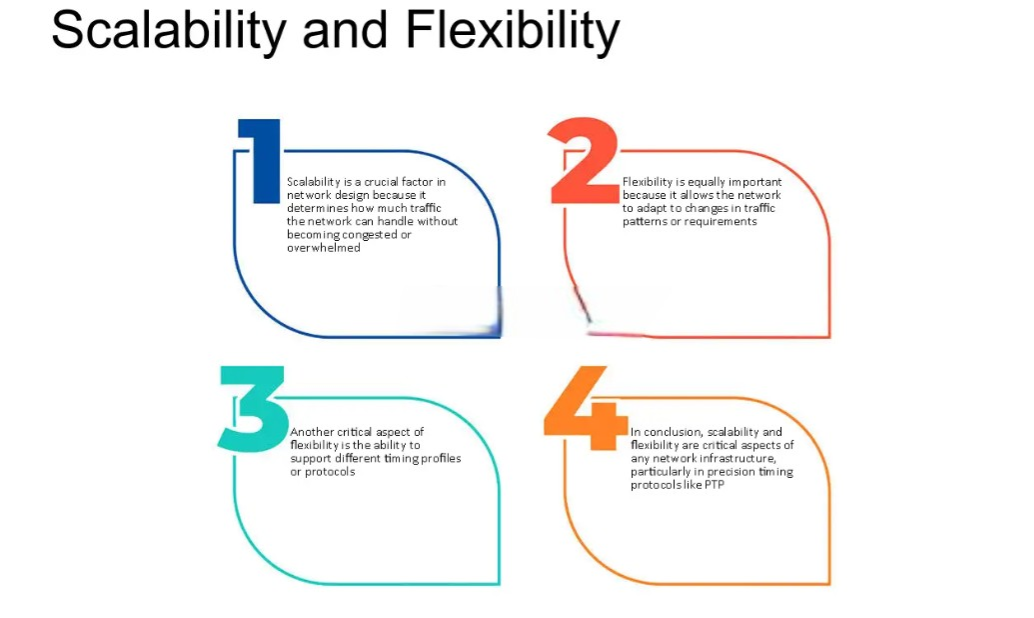
How networks adapt and grow, covering Scalability, Flexibility, Supporting different timings, and the need for precision in protocols like PTP
Take Adobe, for instance. Once recognized for its traditional boxed software, Adobe has embraced a cloud-based subscription model, delivering its suite of creative tools through the Adobe Creative Cloud. This transition not only enables users to instantly access the latest updates but also provides businesses with the flexibility to adjust their subscriptions according to their current project requirements.
So basically, cloud computing gives businesses the power to be super agile and grow as they need to, keeping them ahead of the game in a world that’s always changing.
Saving costs

Unlocking Financial Potential in the Cloud Computing
Budget is a primary concern for both large-scale events and small businesses alike. However, cloud computing emerges as a standout solution for cost-efficiency. By relying on cloud service providers for IT infrastructure needs, companies can significantly reduce capital expenditures.
The traditional financial strains associated with purchasing and maintaining hardware and software are replaced by a more economical pay-as-you-go model. This shift not only minimizes the initial investment in IT assets but also introduces a flexible cost structure that corresponds to actual business usage and requirements.
This strategic transition can result in substantial cost savings, freeing up funds that can be redirected towards core business initiatives. Ultimately, this fosters innovation and drives overall business growth.
Disaster recovery
Disaster Recovery stands as a crucial pillar. Thanks to cloud computing, companies can shield their data from unpredictable events such as natural disasters or power glitches. This technology delivers dependable disaster recovery solutions, ensuring seamless operations even amidst data loss or system hiccups.
Compliance and security
Ensuring compliance and security in cloud computing is absolutely crucial. Service providers go to great lengths to establish a strong framework of policies and technologies aimed at safeguarding data, applications, and the infrastructure they run on. These efforts are all about meeting regulatory requirements and warding off breaches, ultimately keeping sensitive information safe and sound.
Manage IT infrastructure with low complexity
Simplifying IT Infrastructure Management through Cloud Computing can be a game-changer for businesses. By teaming up with experienced providers, companies can offload the complexities of managing IT infrastructure. This not only reduces operational burdens but also allows internal IT teams to focus on more strategic initiatives.
Cloud services provide scalable and efficient solutions, streamlining processes for smoother operations. With expert management in place, companies can confidently pursue innovation and growth, reassured that their IT backbone is in capable hands, requiring minimal intervention.
Multiple service offerings
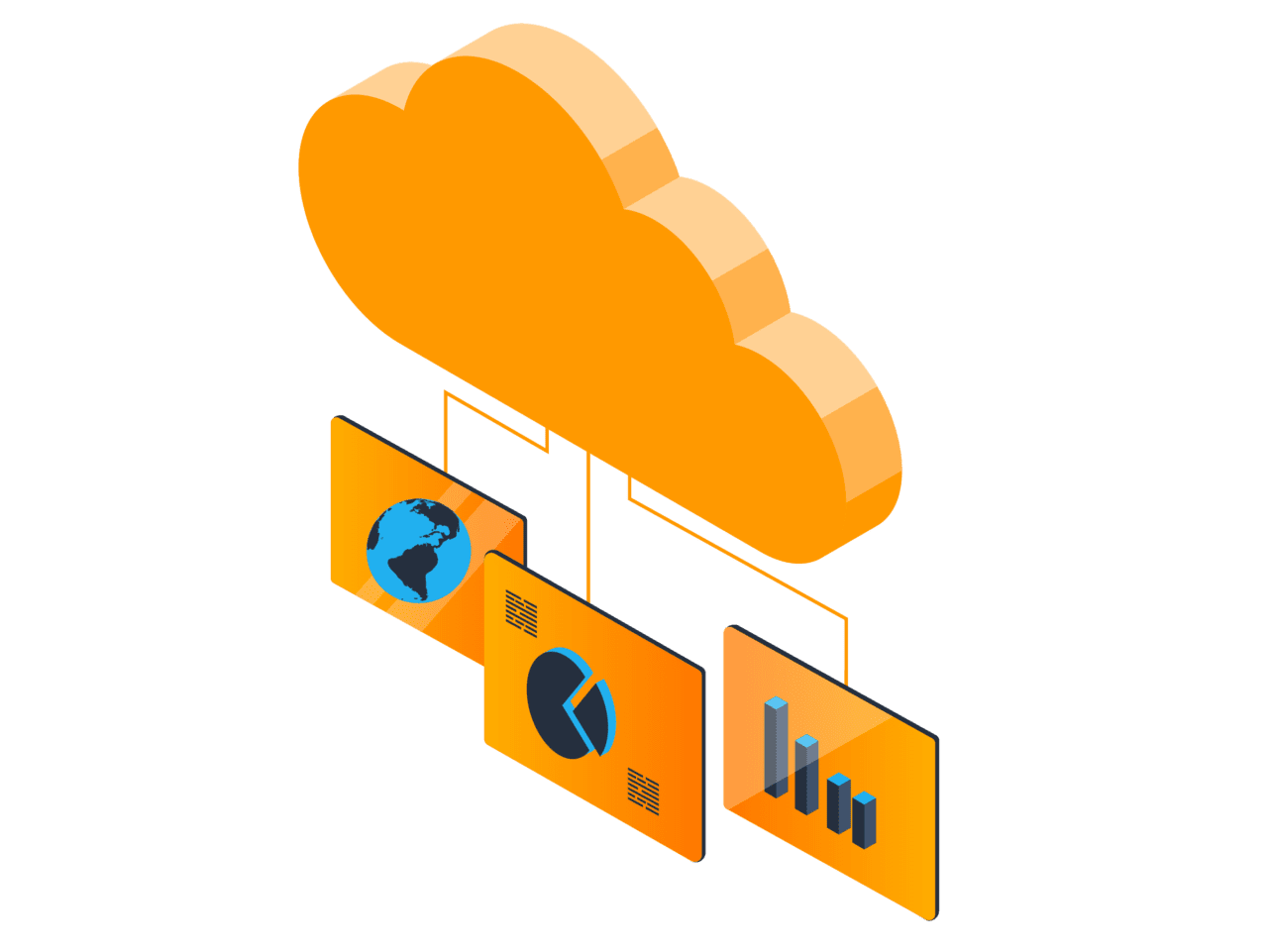
Bringing the world closer with our comprehensive range of cloud-based solutions
Cloud computing is all about providing businesses with what they need, precisely when they need it. Picture it as a one-stop shop for tech solutions. You’ve got Infrastructure as a Service (IaaS), where you can access virtual computing power online. Then there’s Platform as a Service (PaaS), which streamlines app development and management. And of course, Software as a Service (SaaS) hooks you up with software on demand, typically on a subscription basis.
These options aren’t just convenient—they’re game-changers for businesses. With cloud services, companies of any size can access IT solutions that are flexible, scalable, and won’t break the bank. For more information about Multiple Service Offerings, in the next section, we’ll delve into analytics about Types of on-demand cloud computing and cloud service models.
Types Of On Demand Cloud Computing
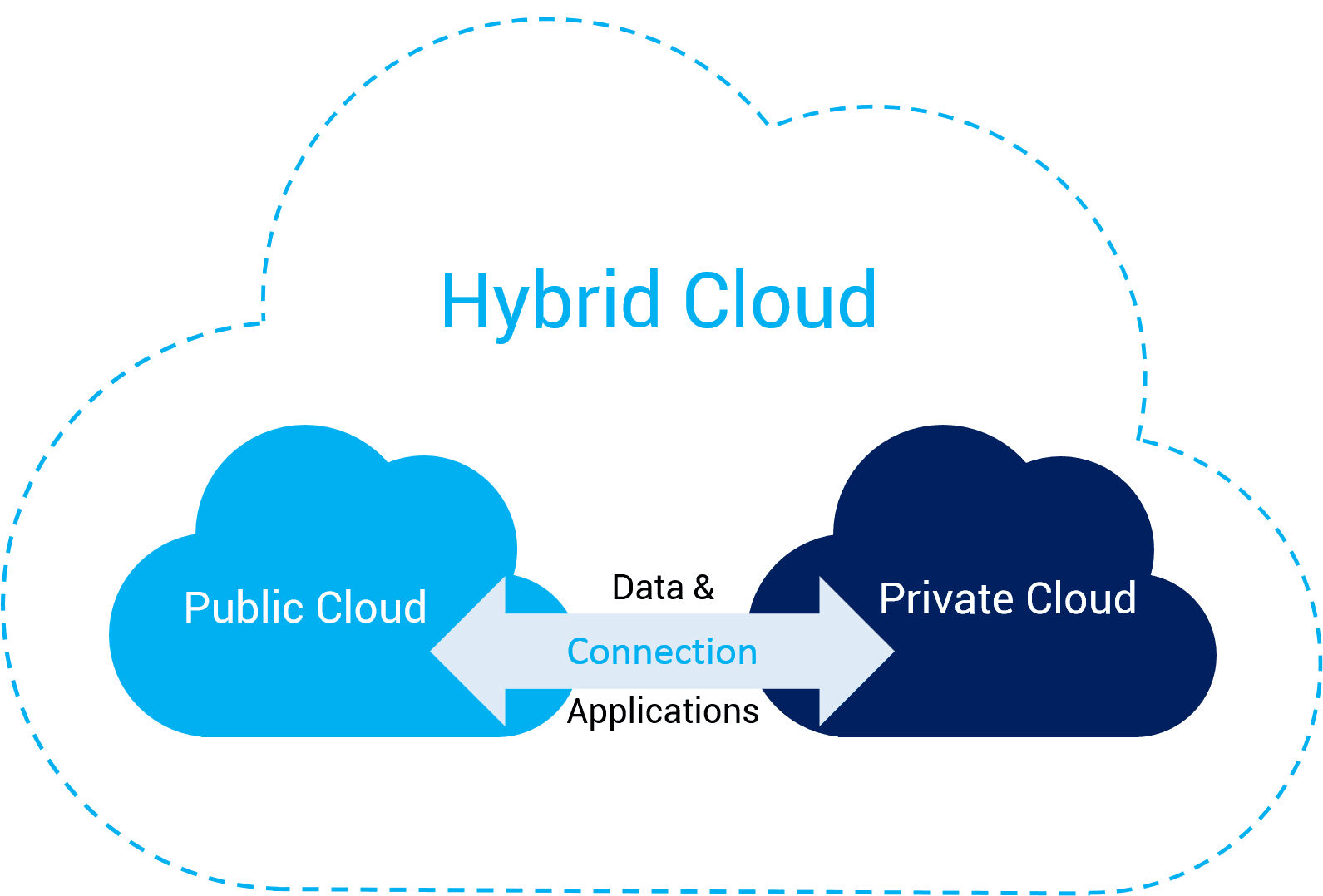
A diagram illustrating the concept of a hybrid cloud, where Public Cloud and Private Cloud are interconnected through Data & Connection, showcasing one of the types of on-demand cloud computing
The cloud offers three deployment models: private, public, and hybrid. Each model ensures users can access files and applications anytime, anywhere, but they differ in approach. Choosing the right one for your business depends on factors like your cloud usage, data regulations, and other considerations.
Looking For a Dedicated Team?
Seeking to enhance your business through expert IT consulting in the realm of Cloud Computing? Look no further than Savvycom for exceptional guidance and solutions! With a rich history spanning over 15 years in the industry, Savvycom provides customized consulting services tailored to address the unique requirements of your business in the Cloud. Leverage our extensive expertise as a prominent IT consulting firm in Asia to streamline your operations, foster innovation, and attain outstanding success in the Cloud environment. Let’s join forces to unleash the full potential of your enterprise in the realm of Cloud Computing!
Public Cloud
Public Cloud services have completely transformed how we access resources online. Instead of relying on private clouds, which are expensive to set up and maintain for one organization, public clouds are managed by third-party providers and offer a more cost-effective solution. With public clouds, you only pay for what you use, making it flexible and economical. While private clouds are still essential for businesses with strict data privacy requirements, public clouds are ideal for those who need scalability and want to streamline their operations without heavy upfront investments.
Private cloud
Private Cloud solutions give organizations more control, customization, and security. Unlike public clouds, which are all about cost-efficiency and accessibility over the open internet, private clouds offer a dedicated space. This means your data stays private and compliant with regulations. That’s perfect for businesses with sensitive data or specific needs.
With a private cloud, you get to manage your IT infrastructure exactly how you want, giving you more flexibility and security. It’s like having your own fortress for your data, ensuring it stays safe and enabling your business to run smoothly and securely.
Hybrid cloud
Hybrid Cloud is a cutting-edge solution that blends the best features of public and private clouds. It offers businesses the advantages of public clouds, such as scalability and cost-efficiency, while maintaining the security and control inherent in private clouds. This approach proves especially valuable for industries governed by strict data privacy laws.
Take, for example, a scenario where sensitive information is safeguarded on a private cloud, yet seamlessly accessible through applications hosted on a public cloud. With a hybrid cloud setup, companies can leverage cloud-based CRM systems while ensuring that regulated data remains protected within a secure private infrastructure. This adaptability positions hybrid cloud as the preferred choice for businesses striving for a harmonious balance between cloud accessibility and data privacy.
Types Of Cloud Service Models
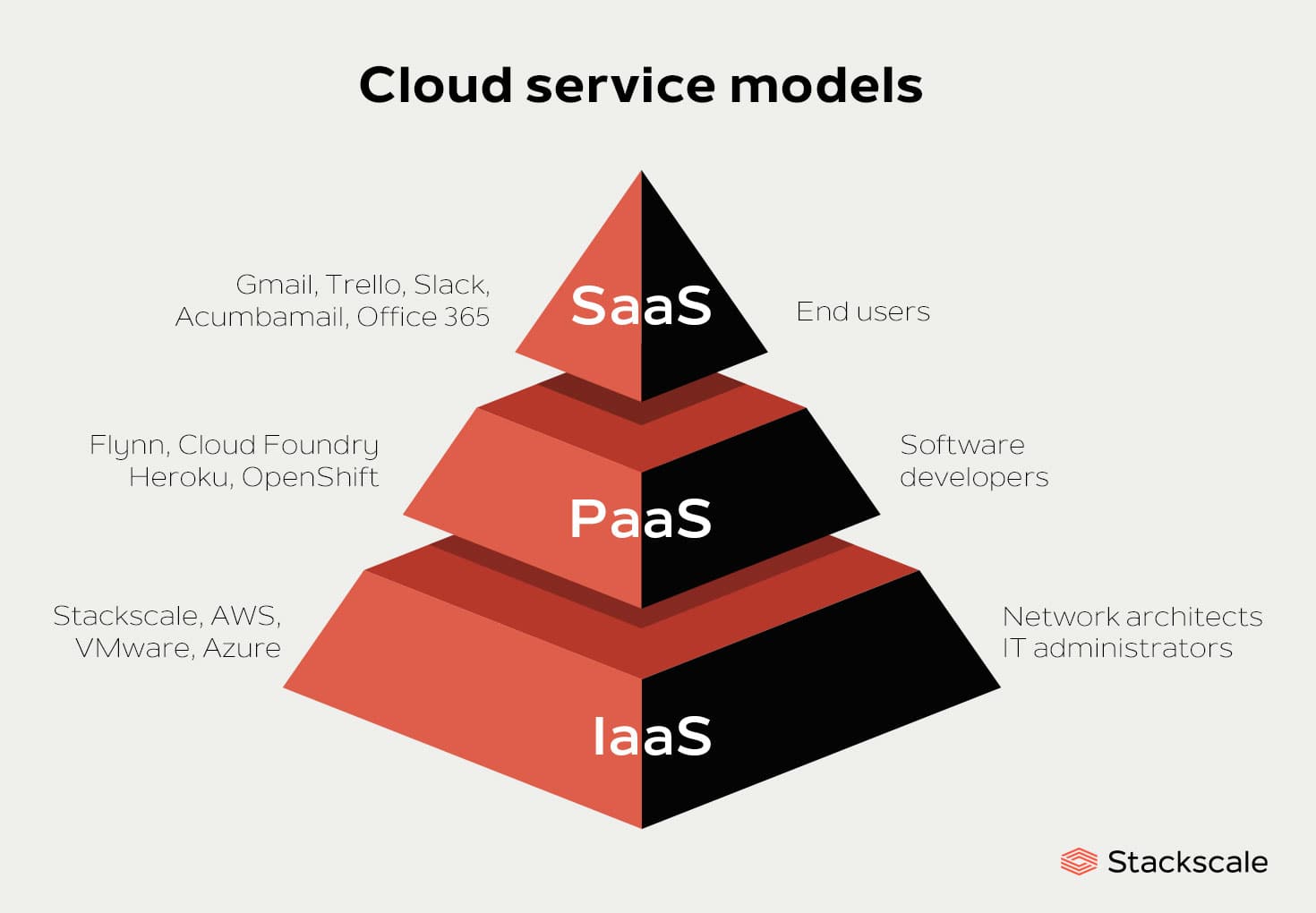
Image depicts the hierarchy of different cloud service models
Cloud computing provides various service models designed to meet diverse needs and preferences. These models outline how users engage with and make use of cloud resources. grasping these models is crucial for making well-informed choices regarding embracing cloud technology.
Infrastructure as a Service (IaaS)
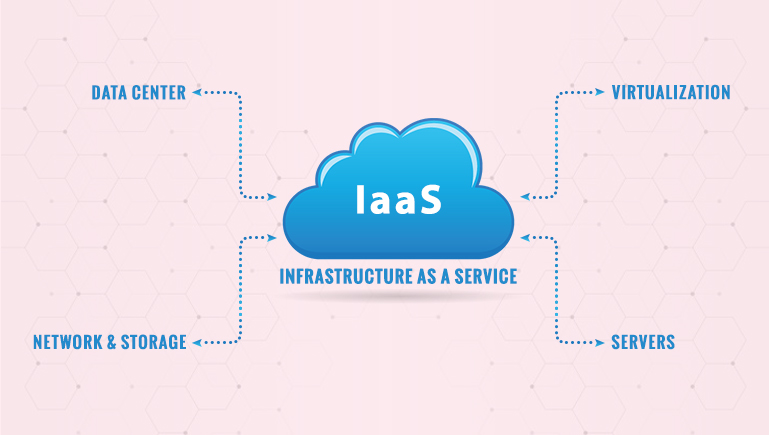
The concept of Infrastructure as a Service (IaaS), showcasing its components such as data center, network & storage, virtualization, and servers, all provided through cloud computing – Image source: MOBiWeb
Infrastructure as a Service (IaaS) is a crucial part of cloud computing. It provides virtualized computing resources over the internet, including servers, storage, and networking. This setup gives businesses the freedom and control to manage their IT resources efficiently.
IaaS offers a high degree of customization and management control, similar to traditional IT setups. However, it also brings the scalability of cloud computing, making it suitable for organizations that want the familiarity of their existing IT systems along with the advantages of cloud-based infrastructure.
- Below are the advantages and disadvantages of IaaS
|
Advantages |
Disadvantages |
|
Highly flexible cloud service model |
Potential risks on virtual machines or hosts |
|
No need to invest in physical servers |
Infrastructure may lack controls for application protection |
|
Scalable resources; adjust as needed |
Additional training may be required for efficient management |
|
Pay-As-You-Go model; pay only for what you use |
Security concerns due to shared infrastructure |
|
Automates distribution of storage, servers, and networks |
Dependence on internet connectivity for access |
Some examples of the biggest cloud providers in the IaaS (Infrastructure as a Service) category include:
-
- Amazon Web Services: Known for its comprehensive and broadly adopted cloud platform.
- Microsoft Azure: Offers a wide range of cloud services including IaaS, PaaS, and SaaS.
- IBM Cloud: Includes a set of cloud computing services for businesses.
- DigitalOcean: Focuses on simplifying cloud computing for developers.
Platform as a Service (PaaS)
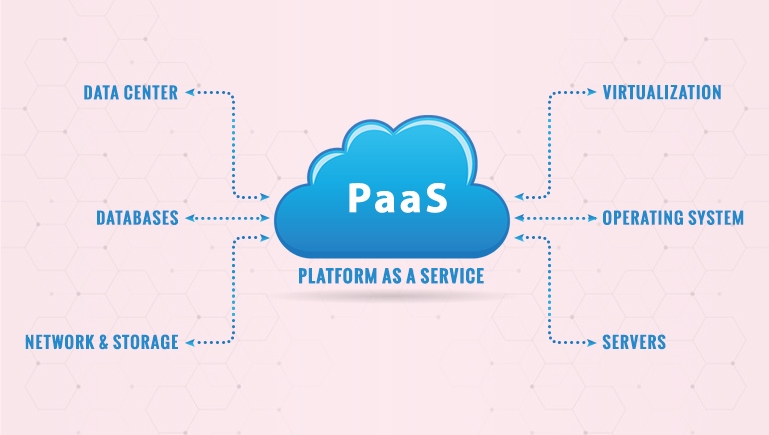
Image showing how PaaS works – Image source: MOBiWeb
Platform as a Service (PaaS) basically takes away all the hassle of managing the nitty-gritty technical stuff for developers. Instead of worrying about servers, operating systems, and software updates, they can just dive into building and managing their applications. PaaS handles all the backend complexities, so developers can focus solely on crafting their apps. It’s like outsourcing the grunt work, allowing creators to unleash their creativity and roll out new solutions faster than ever before.
- Here are the pros and cons of Platform as a Service (PaaS)
|
Pros |
Cons |
|
Facilitates easy collaboration among teams |
Data processed by a third party, raising security concerns |
|
Cost-effective; reduces overall development expenses |
Potential compatibility issues with external elements |
|
Immediate deployment of applications built on the platform |
May not be optimized for certain frameworks or languages |
|
Highly scalable and flexible; adapts to business growth |
Possible challenges when integrating with legacy systems |
|
Allows for customization and updates within the platform |
Dependence on provider’s stability and long-term viability |
Here are a few instances of businesses within the Platform as a Service (PaaS) sector, delivering cloud-based computing solutions:
- Heroku: Known for its user-friendly interface and ease of use, it’s a favorite among developers for personal and production projects.
- Oracle Cloud Platform: Offers a comprehensive suite of application development services built on cloud infrastructure.
- IBM Cloud Foundry: Provides a cloud-native platform for building, running, and managing applications.
Software as a Service (SaaS)
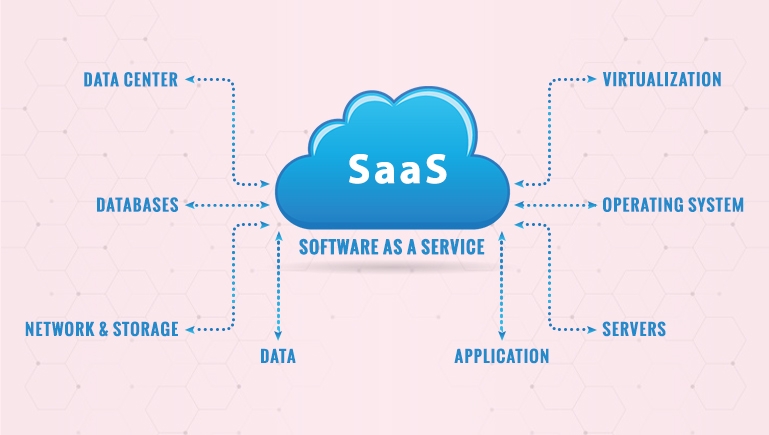
SaaS allows users to access applications hosted by a provider over the internet. The provider manages infrastructure like servers, operating systems, and databases. Users can access applications remotely without local installation – Image source: MOBiWeb
Software as a Service (SaaS) transforms how software is delivered by offering applications online through subscription plans. With SaaS, users don’t have to deal with the hassles of installing, handling, or updating software on their own devices. Instead, they get a fully managed product, letting them concentrate solely on using the software. This model suits individuals and businesses looking for hassle-free access to software, as the provider takes care of maintenance and infrastructure. SaaS streamlines workflow by ensuring users always have the latest software and features without having to bother with manual updates or system upkeep.
- Sure, here are the advantages and disadvantages of Software as a Service (SaaS)
|
Pros |
Cons |
|
Easy to set up and use |
Limited control over the operation |
|
Accessible via the internet |
Potential compatibility issues with other tools |
|
No local resource usage |
Risks of service disruption affecting business |
|
Automatic updates and management |
Complexity may limit integration with services |
|
Simplified purchase and discovery |
Dependency on provider’s infrastructure |
Here are some examples of companies in the Software as a Service (SaaS) industry providing cloud-based computing solutions:
- Dropbox: A file hosting service that offers cloud storage, file synchronization, personal cloud, and client software.
- Google Workspace: A suite of cloud computing, productivity, and collaboration tools, software, and products developed by Google.
- Microsoft Office 365: A line of subscription services offered by Microsoft as part of the Microsoft Office product line.
- Slack: A messaging program designed for teams and workplaces that can be used across multiple devices and platforms.
- Zoom: A video conferencing service that provides a remote conferencing service that combines video conferencing, online meetings, chat, and mobile collaboration.
Pros and Cons
Cloud computing has its perks and hurdles for businesses. On the bright side, it allows companies to easily adjust their resources to meet demand, making scalability a breeze. This means they can streamline operations without worrying about overwhelming their systems. Plus, it’s budget-friendly since they only pay for what they use, cutting down on unnecessary infrastructure costs.
Another big plus is accessibility. With cloud services, employees can work from pretty much anywhere with an internet connection. This flexibility boosts productivity and keeps businesses agile in today’s fast-paced world. Plus, ditching physical servers can save a ton on maintenance costs, which is always a win.
But, it’s not all sunshine and rainbows. Data security is a big concern. Companies need to make sure their data is locked down tight in the cloud to prevent any unauthorized access or breaches. And let’s not forget about the need for a reliable internet connection. Without it, operations can grind to a halt, causing major headaches.
So, while cloud computing offers a lot of benefits like efficiency and flexibility, it’s crucial for businesses to weigh the risks and beef up their security measures. With the right precautions in place, they can enjoy the perks of the cloud while minimizing potential pitfalls.
Vietnam: A Rising Hub for Cloud Computing Endeavors
Vietnam is rapidly becoming a key player in the world of big data on cloud computing. In 2023, its market size hit a notable USD 1,638.33 million, with expectations of steady growth at a Compound Annual Growth Rate (CAGR) of 19.48%. By 2030, it’s forecasted to reach USD 4,765.85 million. What’s behind this surge? Primarily, it’s the adoption of cutting-edge technologies like the Internet of Things (IoT), edge computing, and the advancement of 5G infrastructure.
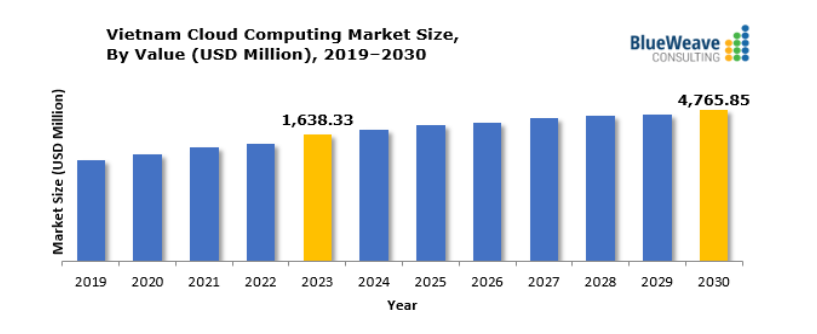
Vietnam Cloud Computing Market Size – Image source: BlueWeave
Currently, 56% of Vietnamese businesses are using cloud management platforms. Additionally, there are plans to increase spending on hybrid cloud computing from 41% to 43% by 2023. This signals a clear commitment to embracing innovative solutions in the technology landscape.
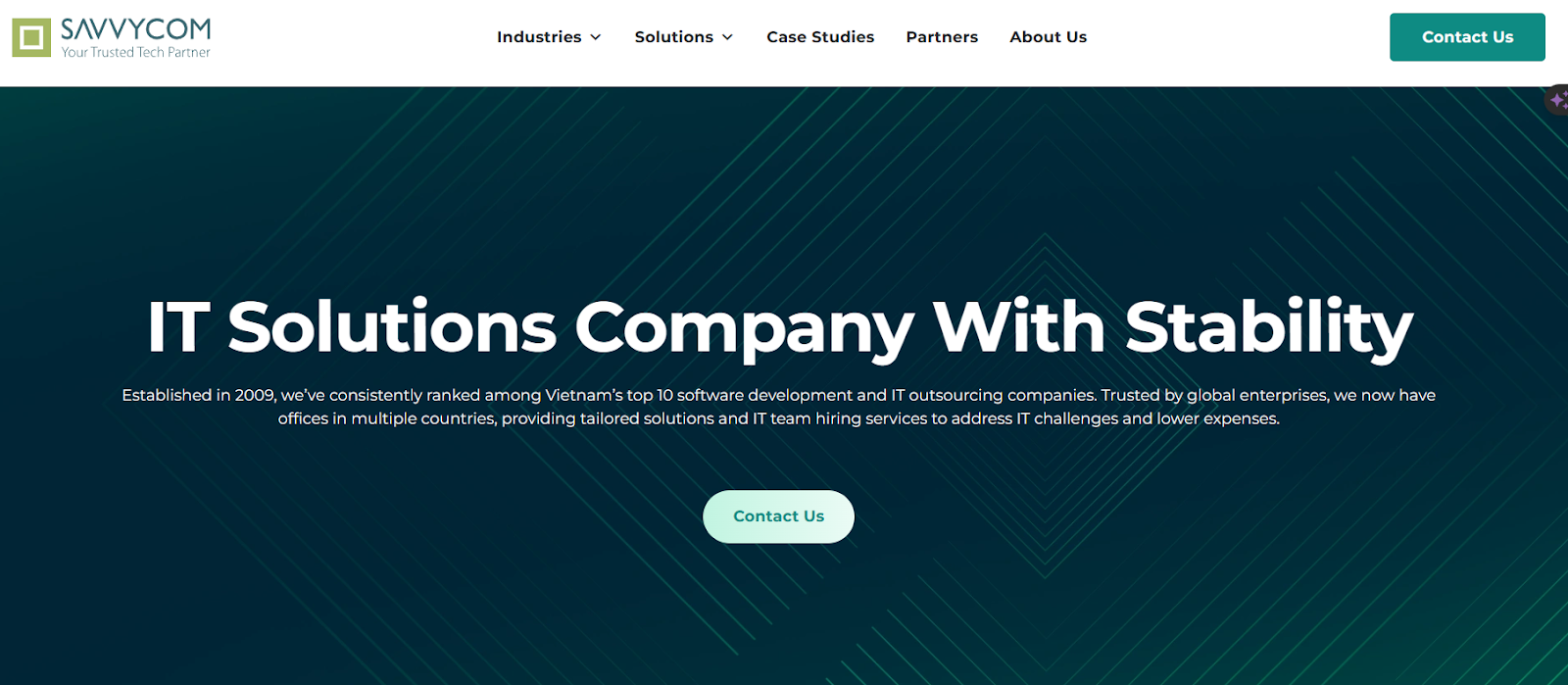
Savvycom offers the best cloud computing solutions for small businesses
The government’s National Digital Transformation Program plays a crucial role in this upward trajectory. It demonstrates Vietnam’s commitment to becoming a leader in the digital realm, leading to the emergence of numerous software development firms and cloud computing companies. One such notable company is Savvycom, founded in Hanoi in 2009. Savvycom is a prominent IT firm in Vietnam, specializing in digital transformation consulting and software solutions for finance, healthcare, and retail sectors both domestically and internationally.
With over 15 years of experience, Savvycom has focused on driving the growth of its clients, boasting a team of over 700 skilled engineers and completing more than 500 projects. The company aims to elevate Vietnam’s global IT standing by harnessing local technical talent and aspires to be a top IT firm in the ASEAN region. With such promising growth trends and strategic initiatives underway, Vietnam is poised to make a significant impact in the global cloud computing landscape.
Frequently Asked Questions
How Cloud Computing Helps Businesses?
Cloud computing brings several advantages to businesses:
- Cost Savings: It saves money by removing the need for upfront investments in infrastructure.
- Efficiency and Performance: Accessing resources on-demand enhances efficiency and performance.
- Flexibility and Scalability: Businesses can easily adjust resources according to their needs.
- Improved Collaboration: Cloud-based tools make collaboration among employees smoother.
How many companies use cloud computing?
94% of all companies worldwide use some kind of cloud computing service in 2023 that help them run their operations
The Bottom Line
In today’s digital landscape, cloud computing stands out as a versatile, adaptable, and budget-friendly solution for fulfilling a company’s IT requirements. With its array of deployment options and service choices, cloud computing empowers businesses to foster innovation and expand seamlessly.
Looking for a Trusted Tech Partner That Delivers Your Measurable Values?


